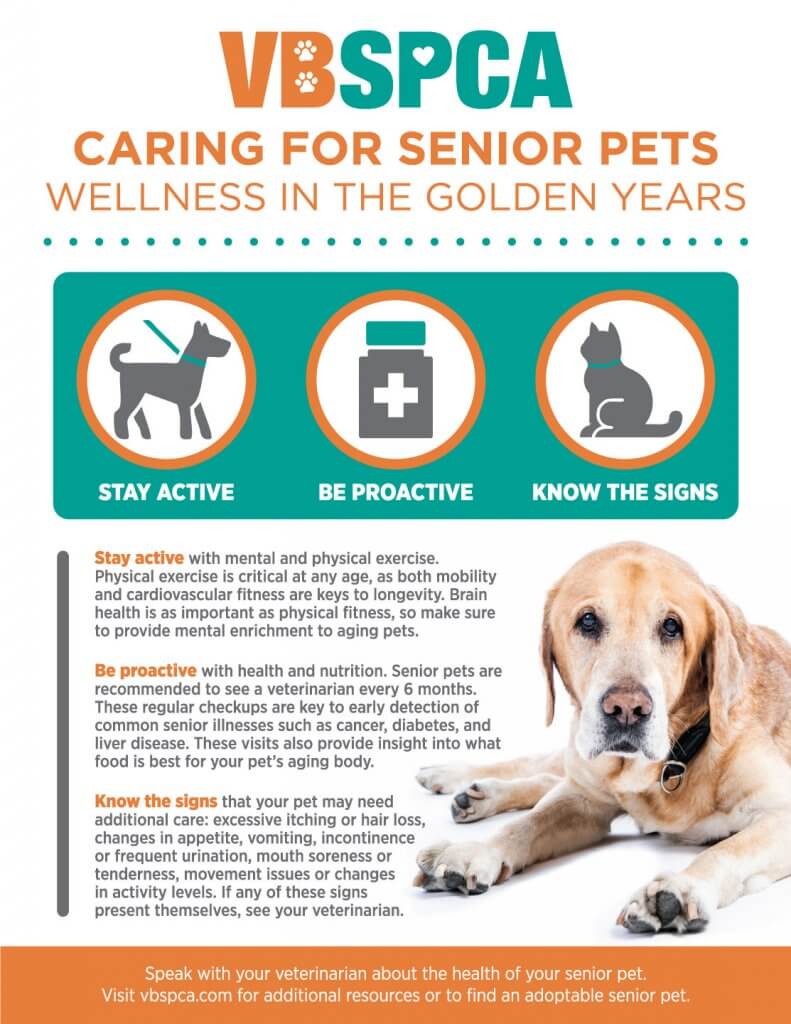Sooner or later, age catches up with all of us…. even our furry family members. While senior pets tend to be more mellow and easier to manage, there are a few things to keep in mind to make sure you are providing the best care for your four-legged friend. Read our following tips below, and download our infograph to share with senior pet parents in your community.
Stay active
- Physical exercise is critical at any age, as both mobility and cardiovascular fitness are keys to longevity. Continue to take walks for exercise, but make sure to adapt your route based on your pet’s ability. If your pet is experiencing joint or muscle stiffness, you can blend gentle massages with short walks around the house to keep the joints mobile.
- Brain health is as important as physical fitness, so make sure to provide mental enrichment to aging pets. Take new routes on your walks to expose your pet to different sights and smells. If walks become challenging, try wandering the yard instead. You can also hide treats around the yard or house and encourage your pet to locate them. This provides the opportunity for discovery, which is good for the brain at any age.
Be proactive with health and nutrition
- Senior pets often have special diet and nutrition needs, and these needs can vary depending on your pet’s overall health. Whether you’re dealing with obesity or a more complex systemic imbalance, consult your veterinarian to ensure that you’re feeding your pet the right food.
- Regular vet checkups become increasingly more important as pets age, and it is recommended that senior pets see a veterinarian every 6 months. These regular checkups are key to early detection of common senior illnesses such as cancer, diabetes, and liver disease.
Know the Signs
- If you notice any of the following signs, your pet may be in need of additional care: excessive itching or hair loss, changes in appetite or vomiting, incontinence or frequent urination, mouth soreness or tenderness, movement issues, or changes in activity levels. If any of these signs present themselves, see your veterinarian.
Being present for the golden years can provide some of the most rewarding moments of pet companionship. Yes, the medical costs can increase and more tender care may be required, but the bond that exists is extremely special. The end will always be inevitable, but as compassionate, attentive pet parents, we can provide a final chapter that is rich in the moments that make living worthwhile. We are their whole world.
If you are looking to welcome a senior pet into your home, visit our adoptable animals page here.





Last Updated: June 1, 2022 by vbspcaadmin
Caring for Senior Pets – Wellness in the Golden Years
Sooner or later, age catches up with all of us…. even our furry family members. While senior pets tend to be more mellow and easier to manage, there are a few things to keep in mind to make sure you are providing the best care for your four-legged friend. Read our following tips below, and download our infograph to share with senior pet parents in your community.
Stay active
Be proactive with health and nutrition
Know the Signs
Being present for the golden years can provide some of the most rewarding moments of pet companionship. Yes, the medical costs can increase and more tender care may be required, but the bond that exists is extremely special. The end will always be inevitable, but as compassionate, attentive pet parents, we can provide a final chapter that is rich in the moments that make living worthwhile. We are their whole world.
If you are looking to welcome a senior pet into your home, visit our adoptable animals page here.
Category: VBSPCA News Tags: Health, senior pets, Wellness
Search
Ways to Give
Annual Sponsors
To view our Donor Privacy Policy, click here.